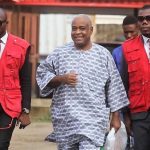...To get all news updates, Join our WhatsApp Group (Click Here)
Also Join our WhatsApp Channel (Click Here)
They were accused of conspiring and kidnapping Sylvanus Ahanonu Hafia at about 5:30 pm on June 23, 2014, at Kara Street, Amuwo Odofin in Lagos and were alleged to have captured and detained Hafia and demanded a ransom of $2m.
But they pleaded not guilty to the four charges.
The judge held that the sentence would serve as a deterrent to other aspiring kidnappers
You can get every of our news as soon as they drop on WhatsApp ...To get all news updates, Join our WhatsApp Group (Click Here)
Also Join our WhatsApp Channel (Click Here)

















